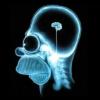I regularly take 5g (1 tsp) glycine prebed most every night. I have found it to help my sleep quality, and there is the additional benefit that is stimulates increased hGH release. There is also evidence for its beneficial impact on several neurological conditions.
Okay, so my 64 y/o healthy mother has difficulty sleeping most nights. I thought I would try giving her a 5g dose of glycine taken sublingually for 1 minute before washing it down with some water. Her reaction took me by surprise to say the least. The partial sublingual dosing likely explains the rapidity of the following reactions. First, within less than 2 minutes she had difficulty speaking. Very labored speech, slurred, and had a strange sensation in her tongue. Within a couple more minutes she began having fits of laughter for no apparent reason. In all honesty if I hadn't known better I would have thought her drunk (she had not consumed anything prior). The laughter passed after about 5 minutes and then she became much more subdued with slight nausea. I made sure that she stayed stable before leaving as she was going to sleep. I am sure there are many other symptoms I may not have caught or been aware of at the time.
I proceeded to do some searching on Google; the only thing I could find was potentially fatal hyponatremia as a reaction to hypotonic glycine solutions used for urologic irrigation. Reference
I am very interested in getting some feedback on the above as nothing I have read with regards to glycine supplementation mentions any type of serious side effects. I am aware of glycine's role with the NMDA receptor but am at a loss for explaining what happened.























































